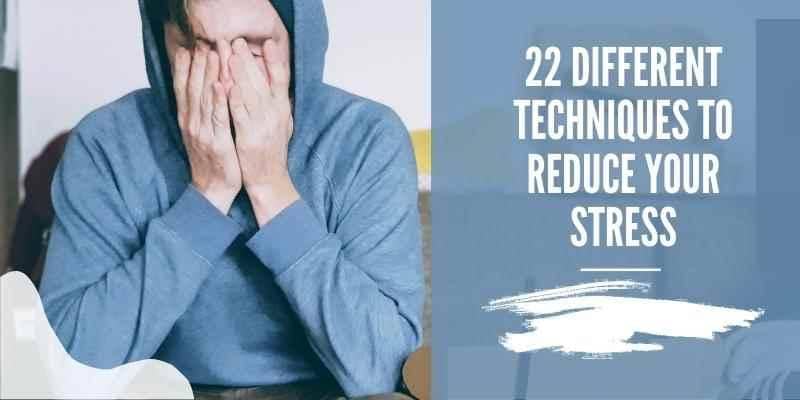Being stressed is anything but fun, but for some reason, most people are somewhat addicted to it.
I, too, have bought into the idea that I wouldn’t get anything done if I wasn’t stressed.
To have a better lifestyle, it is crucial to reduce the stress that drains us.
Long-lasting stress (lasting more than a few days) weakens the immune system. As we grow older, we become more susceptible to stress.
Stressed individuals aren’t the only ones who pay the cost. According to a study, workplace stress causes an additional 5 to 8 percent of national health expenditure.
With the COVID-19, reducing stress is a big deal now more than ever. Since most people have been suffering financially, I decided to list the most powerful ways to relieve stress.
How Can We Measure Stress?
Before we begin, I would like to mention that practice is a must for any of these ways to be effective. I usually recommend at least 21 to 28 days of practice.
Prior to starting, consider a scale of 0 to 10. On the scale, 0 is no stress or anxiety, while 10 is the most distress you can imagine. Trust your intuition and give yourself a number.
Sometimes, it is difficult to assign a number to your emotions. In that case, you can use the emoticon scale as illustrated below.
After practicing the techniques, look at the scale again and observe whether it was effective.
You may also want to consider spending around 5 minutes with different techniques at different times of the day.
For example, pick a technique like 4-7-8 and practice it every night for 5 minutes. Also, choose Mandala Coloring for 5 minutes when you are looking for a break from your work, etc.
22 Different Relaxation Techniques
Feeling overwhelmed and stressed? Try these 22 simple techniques to reduce your stress and boost your overall well-being.
1. 4-7-8 Breathing Techniques
The 4-7-8 breathing technique is an excellent exercise to do before sleeping, especially if you suffer from sleep issues.
Dr. Andrew Weil developed this technique. Here are the steps to practicing it effectively:
- Sit in a comfortable position or lie on your back.
- As you breathe in, slowly count to 4.
- Hold your breath for a count of 7.
- As you breathe out through your mouth, slowly count to 8.
- Do this a few times in a row.
I usually encourage my clients to imagine the following scenario to make the technique more effective:
- Imagine you are blowing air in a balloon (your stomach) to a count of 4
- Hold in the inflated balloon (stomach) to the count of 7.
- Make a whoosh sound as you deflate the balloon (flatten your stomach) to the count of 8.
If you find this practice too tricky, you can try holding your breath for a shorter amount of time.
Here is a video demonstration of Dr. Andrew Weil for you to practice along.

2. Alternate Nostril Breathing
Alternate nostril breathing is an ancient yoga breathing technique from India.
A 2013 study found that slow breathing exercises such as alternate nostril breathing are beneficial for cardiovascular and perceived stress.
Here are the steps to practice this type of breathing:
- Sit in a comfortable position, preferably with your legs crossed.
- Exhale completely; imagine all the air leaving your lungs.
- Use your right thumb to close your right nostril.
- Inhale through your left nostril.
- Now close your left nostril with your right pinky finger.
- Open your right nostril and exhale.
- Inhale through the right nostril and then close it with your thumb again.
- Repeat several times.
Here is a video demonstration so you can follow along with the breathing.

3. Body Scan
I like to listen to guided body scans as a way to de-stress before going to sleep.
Here are the beginner’s steps for a full body scan meditation:
- Sit or lay in a comfortable position.
- Closing your eyes will help you focus more.
- Take a deep breath in.
- Focus on the part of your body and observe the sensation you feel.
- Let the sensation pass with no judgment.
- Move on to another body part.
- In the end, take a few deep breaths and tune in to your body as a whole.
- You may find it hard to keep your focus initially, but it will get better with practice.
I prefer doing body scans as I lay in my bed at night, but you can do it at any time during the day. Here is one of my favorite recordings for a guided body scan.
4. Aromatherapy and Scented Candles
My go-to relaxing technique in the evening is using an oil diffuser or scented candle. You can learn more about how aromatherapy works and practice the one you find compelling.
One of the most common essential oils used in aromatherapy is lavender. It is known to reduce stress, as well as promote better sleep.
If you’re not a fan of using essential oils, scented candles are almost as effective. Here is a list of the best non-toxic candles you can use safely to reduce stress.
Learn more about non-toxic candles at healthymaven.com
5. Listening to Calming Music
Several studies show that listening to music around 60 beats per minute produces alpha brainwaves, called ‘relaxed waves.’
Whenever I feel like I need to relax, I look up meditation music and let myself sink in the sounds.
Everyone has different preferences for the music they find relaxing. Remember that there is no right or wrong. Find a piece that you enjoy and settle in a spot where you can enjoy it with no disruptions.
6. Journaling
Whenever I feel overwhelmed, I can quickly fill up a few pages in my notebook about everything, I think.
Writing is constructive when my stress involves anger at another person.
Writing down everything that I’m thinking and would like to say to them keeps me from saying words I may regret later on.
That being said, I am aware that a lot of people feel unsafe about journaling.
I usually advise my clients that if they find journaling useful, they should go ahead with it. Write down whatever you need to, and then discard it immediately if you don’t want anyone else to read it.
7. Talking to Someone You Trust
This could be a close family member or a trusted friend.
Hearing a reassuring voice when you’re stressed can make a huge difference. It is essential to have people around you who you can talk to without feeling judged.
Another benefit of talking to someone you trust is that it allows you to see things from another perspective.
Often, having a listening ear, you can vent to relieve half the stress you’re feeling. Chances are, the problem you’ve been stressed about won’t seem as big when you say it out loud. This offers you mental clarity, and you can bring things into perspective.
Alternatively, you can book a counselling session with me so we can walk through your healing journey together.
8. Punching Pillow
What can I say?
Sometimes the stress and anger get too much.
You need to scream, punch a pillow, or stomp your feet.
And that’s okay. Anger is an emotion, and it is normal to experience it.
What is important is how you deal with the stress you are experiencing.
If you can find a way to release that anger in a way that doesn’t cause harm to yourself or anyone else, there’s nothing wrong with it.
So go ahead. Punch that pillows and see if it helps you let go of the negative energy inside you.
9. Indulging in Art & Craft
Visually expressing my feelings has been a great help in dealing with my emotions.
You don’t need any artistic skills – collaging and scrapbooking are easy ways to get started.
Adult coloring books have also become a popular stress-busting method.
You can find some free pages to print online or search for designs on your favorite topics.
Studies support drawing and coloring as stress and anxiety-reducing activities.
I enjoy doing Mandala drawing and coloring. I often recommend this technique to my clients, and many of them find it a great stress-reliever.
10. Going Out for a Run
Moving your body is a great way to help release some of the pent-up stress.
Going out for a run will allow you to breathe in some fresh air and get a change of scenery.
You can also indulge in other aerobic exercises if you’d like.
Distraction Techniques
To be honest, sometimes I’m too overwhelmed to do the “right things.”
I don’t feel like trying a breathing technique. Many of my clients also say that it is hard for them to focus on anything when they’re feeling anxious. If you experience that feeling, you can try some of the following techniques instead:
11. Watching Something Funny
A study found that humor has excellent effects on our immune system. I have old favorites that I return to when I’m feeling stressed. You can also ask your friends for recommendations and binge-watch shows on your couch.
12. Listening to Upbeat Music and Dancing Around
A lot of the time, you just need to forget about whatever problems are troubling you. Studies show that listening to upbeat music and dancing around tricks your brain into feeling happy.
13. Spending Time with Animals
If you’re an animal lover like me, I have good news for you.
Cuddling a pet isn’t just a fun distraction – it has been proven to be a stress reliever.
The moment we’re born, we co-regulate with others.
While we mostly do this with our fellow humans, interacting with animals can have similar effects.
If you are scared of animals or don’t have a pet, you can find plenty of their videos with relaxing background music.
Some Other Ways to Reduce Stress in Everyday Life
There are some things I try to practice daily to prevent my stress from getting worse.
Some of these won’t help in a particular moment when I’m feeling stressed, but I notice their effect on my life.
14. Making Room for An Exercise Routine
I try not to wait until I’m stressed to exercise.
People who exercise regularly experience less depression and anxiety.
There are several reasons for this.
Exercise reduces cortisol, increases endorphins, and regulates your body’s systems, including sleep and digestion.
If you’re able to include some time for exercise in your day, you’ll experience a more relaxed body and mind.
15. Eating A Wide Variety of Healthy Food
One can write an endless amount of books about the importance of diet and its role in stress management.
While certain foods are considered “stress-busting,” the boring advice is the best: stay away from fried and processed food as much as possible.
Instead, try to incorporate a variety of fruit and vegetables into your diet.
Do not, however, shame yourself for the occasional eating out or binge-sessions.
As long as you’re making an effort to do better, it is okay to fall off-track now and then.
16. Taking Supplements
Even if you generally eat healthily, supplements can have a significant effect on your health.
First, get a blood test done to check if you’re deficient in anything.
A B12 deficiency, for example, can cause symptoms like fatigue and rapid heartbeat.
In addition to supplementing any vitamins or minerals you may be low in, several supplements have stress-reducing benefits.
Ashwagandha is an ayurvedic herb that can help in managing stress and anxiety. You can buy ashwagandha as a powder and add it to your smoothies.
17. Making Sure To Get Enough Quality Sleep
Twenty-nine percent of millennials say that they get stressed because of not getting enough sleep. I, too, am one of them.
When I don’t get enough sleep, I feel cranky, stressed, and lethargic.
To combat this, I try to shut off my phone at least 30 minutes before bed. I do some stretching and read a book until I feel sleepy.
I try to make sleep a priority, seeing it as an investment in my health rather than a waste of time.
As mentioned above, I also practice my 4-7-8 breathing technique or listen to calming music like the OM chant.
18. Practicing Saying No
I sometimes still find that I take on more than I can comfortably handle.
It’s better to feel guilty about saying no, than agreeing to something that I don’t have time to do (or just don’t want to do).
Saying “yes” from a people-pleasing perspective not only adds to stress but also causes resentment.
I catch myself having thoughts like, “don’t they see how much I already do for them? Would they even do the same for me?”
In his book When The Body Says No, Dr. Gabor Maté wrote:
“A therapist once said to me, “If you face the choice between feeling guilt and resentment, choose the guilt every time.”
I try to live by this advice. I also encourage my clients to learn to say ‘No’ without feeling guilty. The ultimate goal is to have emotional stability.
19. Cutting Down on Caffeine Intake
Studies show that high caffeine intake (more than five or six cups of coffee a day) is associated with anxiety symptoms.
People who already suffer from anxiety disorders are more sensitive to these effects.
I try to keep my coffee consumption to a maximum of three cups per day.
20. Yoga
There are many different ways to practice yoga, but they all share one goal: strengthening the body-mind connection by linking movement and breath.
Regular yoga practice increases body awareness and promotes relaxation.
A meta-analysis of 25 different yoga studies found that yoga can help regulate two physiological systems involved in stress management: the sympathetic nervous system and the hypothalamic-pituitary-adrenal system.
If yoga isn’t your thing, you can also try Tai Chi or Qi Gong as they have the same benefits.
21. Mindfulness
While yoga is considered a mindfulness activity, I also try to make time for meditation practice.
Meditation has made me more aware of my negative self-talk.
Noticing how often I speak unkindly to myself has helped me feel less affected by these words and beliefs.
22. Keeping A Gratitude Journal
I try to take a moment to write down some positive things that happened during the day or something I’m grateful for at the end of each day.
It helps me remember the good things in my life even when everything feels like it’s going wrong.
Conclusion
Some of these methods might take a while until you feel their benefits. But if you practice them consistently, I’m sure you will feel a difference. Which methods do you resonate with the most?


















